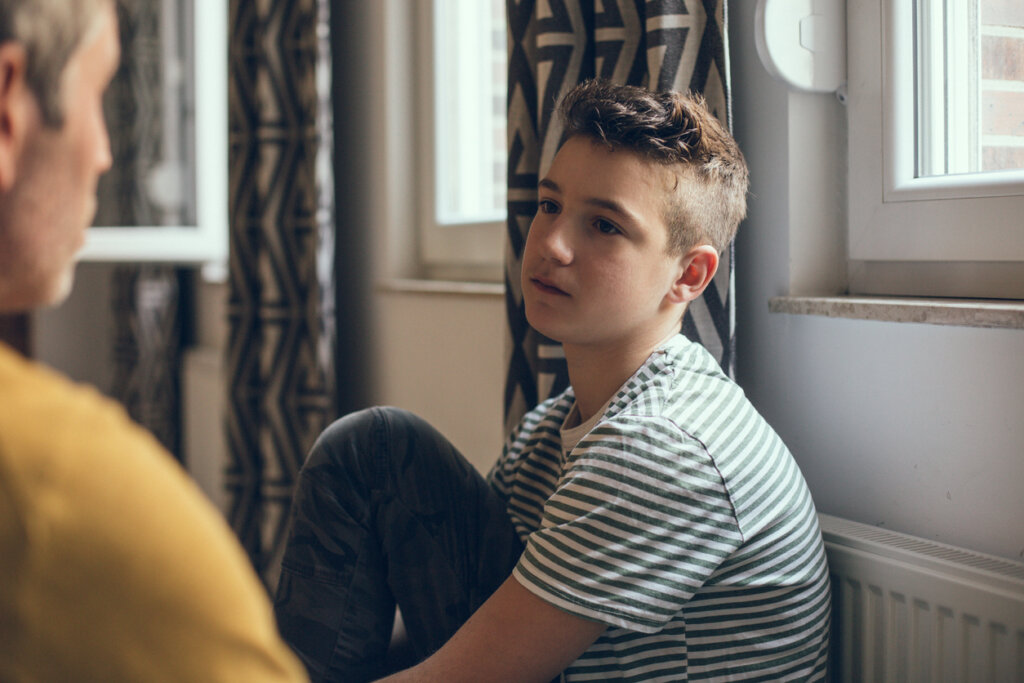What Can You Do if You Have a Child With a Narcissist?


Written and verified by the psychologist Valeria Sabater
The risk of having a child with a narcissist is quite high. In fact, some experts claim that this personality pattern is increasing every year, rather like obesity or hypertension, even though there’s no conclusive data. However, what’s undeniable is that growing up in an environment with these figures causes damage.
Lack of empathy, selfishness, the tendency to manipulate, vanity, no resources for emotional management, and even greed. There are many characteristics that sculpt and sharpen these individuals to the point of becoming dangerous. Therefore, the impact that a narcissistic father or mother can have on the psychosocial development of a child can be both damaging and traumatic.
This psychological condition falls on a spectrum. There’ll be some narcissists with whom you can live and others with whom you can’t and will be forced to abandon. Furthermore, if you have a child with a person with this type of personality disorder you must be aware of the risk factors.
In fact, you’ll have to face what shared parenting will be like. You should also consider some basic strategies to safeguard the well-being of your children.
Narcissistic mothers and fathers often leave their children with more than one psychological problem.

Having a child with a narcissist
Today, there’s an increasing amount of scientific documentation on this subject. In fact, We know that there’s a relationship between the narcissism of the father or mother and the psychological vulnerability of their children. Research conducted by the Sapienza University of Rome confirmed this fact.
Being raised by a narcissistic parent increases the risk of the child developing depression and anxiety. Indeed, there are many adults who go through their lives dragging behind them the imprint of trauma. They carry the weight of that childhood link to the selfish personality of their parents. As a matter of fact, far from providing them with a safe environment in which to grow, these parents stole their childhood and filled them with insecurities.
Therefore, there’s a high risk that narcissists won’t be good parents. So what can you do if you have a child with a narcissist? There’s not only the risk that the child’s psychosocial and emotional development will be affected. There’s also a danger that they’ll acquire the narcissism of their father or mother. For these reasons, a number of strategies need to be adopted. Let’s take a look.
Restrict contact with the narcissist and focus on your needs and those of your child
Perhaps you blame yourself for not recognizing the narcissistic personality of your partner or ex-partner earlier. Those with whom you now share the upbringing of one or several children. If this is the case, you must focus on the most important thing, which is your own well-being and that of your children. Don’t continue to undermine your self-esteem by reproaching yourself for a reality that you couldn’t foresee.
You must exercise self-care, strengthen your self-esteem, and heal any wounds from yesterday due to your damaging relationship. You have a long road ahead of you sharing the raising of your children with them and that requires good emotional preparation.
Restricting contact with your partner is the first step. Makes sure you enlist the support of your family and friends to deal with any associated legal and personal issues.
Establish a parenting and shared education plan
Undoubtedly, there’ll be complications, disharmony, and many disagreements. However, it’s essential that you make it clear to your narcissistic partner or ex-partner what the education of your children is to be like. Especially if you don’t already share a life together.
You must establish certain rules and norms regarding the raising of your child/children and their education. If you can get it agreed in writing, even better.
Stay calm and avoid fights or arguments in front of your children
Narcissists are skilled strategists when it comes to mentally and emotionally destabilizing others. Arguments, disagreements, criticism, and blackmail are their most powerful resources.
Nevertheless, make sure you don’t fall into the trap of fighting in front of your children. Don’t create atmospheres of threat and confrontation.
Promote and develop good emotional intelligence in your children
Narcissistic parents tend to drain the emotions of all the figures in their environment. Therefore, one of the risks of having a child with a narcissist is that they invalidate all the emotions of their child. What the child feels and needs doesn’t matter, only what the narcissist wants is important.
It’s important that, from a really early age, your children develop a good emotional education. Validate what they feel, and teach them to understand, express, and handle every emotion and feeling.
Support your children’s interests
Children with narcissistic parents often end up being a ‘prosthesis’ of their parents. This means that they’re obliged to fulfill the dreams that their parents didn’t achieve. They must fit their expectations, wishes, and personal goals. As a rule, these parents underestimate and devalue the child’s own interests.
Every good father and mother should encourage the development of their child’s identity and personality. This requires knowing and respecting their interests and giving them strengths to achieve their own goals. They should rise up and reinforce their hopes and dreams, not crush and destroy them.
Children of narcissists can grow up with low self-esteem, fragile personalities, and other insecurities. In some cases, they even become narcissists themselves by imitating the personality pattern of the narcissistic parent.

If you have a child with a narcissist, help them develop empathy and self-esteem
There’s a high risk that children will develop the same profile of narcissism as the narcissistic father or mother. In fact, the journal, PNAS ( Proceedings of the National Academy of Sciences) conducted a study that claimed that, in many cases, upbringing and education are risk factors for the development of this trait. Therefore, if you have a child with a narcissist, remember the following goals in their upbringing and education:
- Encourage your child to develop good empathy, and to be able to put themselves in the place of others.
- Help them develop healthy self-esteem.
- Teach them to tolerate frustration.
- Make them understand that there are limits in life and that they can’t have everything they want.
Ask for specialized help if you need it
Last but not least, consider requesting specialized help. After all, co-parenting with a narcissist is no easy task. On the one hand, you feel exhausted due to your own relationship with them, and you may be suffering yourself. On the other, there are all the other usual kinds of discrepancies and disagreements that arise in this type of situation for you to deal with.
Finally, there are your children and their needs. Indeed, they’re the ones who matter most. Therefore, don’t hesitate to seek professional guidance and support.
All cited sources were thoroughly reviewed by our team to ensure their quality, reliability, currency, and validity. The bibliography of this article was considered reliable and of academic or scientific accuracy.
- Dentale, Francesco & Verrastro, Valeria & Petruccelli, Irene & Diotaiuti, Pierluigi & Petruccelli, Filippo & Cappelli, Luigi & San Martini, Pietro. (2015). THE RELATIONSHIP BETWEEN PARENTAL NARCISSISM AND CHILDREN’S MENTAL VULNERABILITY: THE MEDIATION ROLE OF THE REARING STYLE. International Journal of Psychology and Psychological Therapy. 15. 337-347.
- Jabeen, F., Gerritsen, C., & Treur, J. (2021). Healing the next generation: an adaptive agent model for the effects of parental narcissism. Brain informatics, 8(1), 4. https://doi.org/10.1186/s40708-020-00115-z
This text is provided for informational purposes only and does not replace consultation with a professional. If in doubt, consult your specialist.








